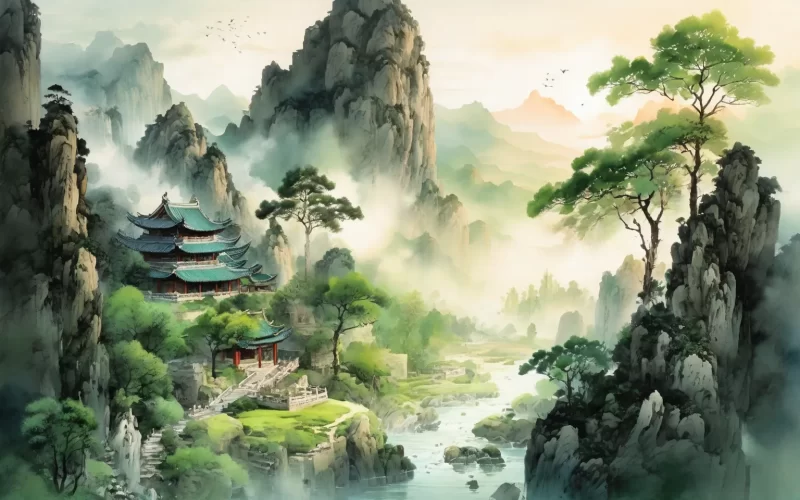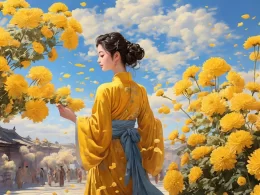Not knowing the way to the Temple of Heaped Fragrance,
Under miles of mountain-cloud I have wandered
Through ancient woods without a human track;
But now on the height I hear a bell.
A rillet sings over winding rocks,
The sun is tempered by green pines...
And at twilight, close to an emptying pool,
Thought can conquer the Passion-Dragon.
Original Poem
「过香积寺」
王维
不知香积寺, 数里入云峰。
古木无人径, 深山何处钟。
泉声咽危石, 日色冷青松。
薄暮空潭曲, 安禅制毒龙。
Interpretation
This poem was composed by Wang Wei during his later years while traveling through the Zhongnan Mountains after retiring from official life. Having grown disillusioned with political pursuits and turning toward Buddhism, he often sought spiritual nourishment in nature's embrace. The Xiangji Temple, nestled deep within these verdant mountains, represented for Wang an ideal sanctuary of tranquility. The poem chronicles his journey to the temple - from initial disorientation to sudden Buddhist enlightenment - embodying his transition from external landscapes to inner peace, and exemplifying his artistic ideal of "painting within poetry, Zen within painting."
First Couplet: "不知香积寺,数里入云峰。"
Bù zhī xiāngjī sì, shù lǐ rù yún fēng.
"Knowing not where Xiangji Temple lay, / Miles I climbed into cloud-veiled peaks gray."
The opening establishes a quest - "knowing not" creates suspense while "cloud-veiled peaks" introduce the mystical mountain atmosphere, setting the tone for spiritual seeking.
Second Couplet: "古木无人径,深山何处钟。"
Gǔ mù wú rén jìng, shēn shān hé chù zhōng.
"Ancient trees guard pathless terrain; / Whence comes the bell from mountains deep?"
The deepening solitude ("pathless terrain") is suddenly pierced by a temple bell's transcendent call - the "whence" question highlighting both the temple's hidden nature and the poet's spiritual awakening.
Third Couplet: "泉声咽危石,日色冷青松。"
Quán shēng yè wēi shí, rì sè lěng qīng sōng.
"Springs sob through craggy stones nearby; / Sunlight chills the pines on high."
The masterful verbs "sob" (咽) and "chill" (冷) anthropomorphize nature while mirroring the poet's shifting consciousness from wonder to meditative stillness.
Fourth Couplet: "薄暮空潭曲,安禅制毒龙。"
Bómù kōng tán qū, ān chán zhì dú lóng.
"Dusk finds the curved pool's vacant face; / Zen quiets the mind's serpent race."
The empty pool at day's end triggers Buddhist reflection, invoking the allegory of taming the "poisonous dragon" of mental afflictions through meditation - a seamless shift from scenery to spiritual insight.
Holistic Appreciation
Titled "Visiting Xiangji Temple," the poem never directly describes the temple itself. Instead, Wang Wei crafts a spiritual journey through layered landscapes: from clouded uncertainty to auditory revelation, through emotional resonance with nature, culminating in Zen realization. The minimalist brushwork creates profound spaciousness, inviting readers to experience both physical pilgrimage and inner transformation. This represents the perfect confluence of Wang's landscape poetry and Chan Buddhist philosophy.
Artistic Merits
- Scene-spirit fusion: Natural imagery perfectly mirrors spiritual progression
- Precision diction: Verbs like "sob" and "chill" achieve dual physical/psychological resonance
- Suggestive depth: Buddhist wisdom emerges through landscape rather than doctrine
- Structural mastery: Four-stage journey mirrors meditation's progressive stillness
Insights
Beyond depicting mountain solitude, the poem models how nature can become a mirror for consciousness. It suggests that true peace comes not from finding external sanctuaries, but from cultivating the "empty pool" within - using mindfulness ("Zen") to subdue our mental "serpents." Wang's poetic journey remains eternally relevant for anyone seeking meaning beyond worldly noise.
Poem translator
Kiang Kanghu
About the poet

Wang Wei (王维), 701 - 761 A.D., was a native of Yuncheng, Shanxi Province. Wang Wei was a poet of landscape and idylls. His poems of landscape and idylls, with far-reaching images and mysterious meanings, were widely loved by readers in later generations, but Wang Wei never really became a man of landscape and idylls.












